CBE Research Areas
Soft Matter and Complex Fluids
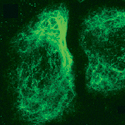 Complex fluids and Soft Matter describe a broad class of squishy materials, such as polymers, gels, emulsions and suspensions whose mechanical properties are governed by the entropic, wetting, hydrodynamic and electrostatic interactions among their supramolecular constituents. Faculty research topics include directed self-assembly of colloids and nanoparticles, particles at fluid-fluid interfaces, glassiness and jamming behavior, as well as applications specific to understanding cell mechanical function, mechano-sensing and tissue engineering.
Complex fluids and Soft Matter describe a broad class of squishy materials, such as polymers, gels, emulsions and suspensions whose mechanical properties are governed by the entropic, wetting, hydrodynamic and electrostatic interactions among their supramolecular constituents. Faculty research topics include directed self-assembly of colloids and nanoparticles, particles at fluid-fluid interfaces, glassiness and jamming behavior, as well as applications specific to understanding cell mechanical function, mechano-sensing and tissue engineering.
Affiliated Researchers: Paulo Arratia, Tobias Baumgart, Russell Composto, John Crocker, Scott Diamond, Dennis Discher, Daniel Hammer, David Issadore, Daeyeon Lee, Andrea Liu, Lu Lu, James Pikul, Chinedum Osuji, Amish Patel, Ravi Radhakrishnan, Robert Riggleman, Talid Sinno, Kathleen Stebe, Karen Winey, Shu Yang
Advanced Materials and Nanotechnology
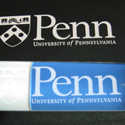 Advanced materials outperform their conventional counterparts with superior optical, catalytic, mechanical, magnetic and thermal properties. Nanotechnology plays a critical role in fabricating advanced materials that can address major challenges in a variety of advanced applications including energy conversion & storage, electronics, photonics, catalysis and biomedicine. Research directions in the department include self-assembly at nano- and micro-scale, interfacial formation of suprastructures, investigation of structure-property relationship at the nanoscale, biomedical application of polymer-based vesicles & stimuli-responsive materials, and computational prediction of crystallization and materials dynamics .
Advanced materials outperform their conventional counterparts with superior optical, catalytic, mechanical, magnetic and thermal properties. Nanotechnology plays a critical role in fabricating advanced materials that can address major challenges in a variety of advanced applications including energy conversion & storage, electronics, photonics, catalysis and biomedicine. Research directions in the department include self-assembly at nano- and micro-scale, interfacial formation of suprastructures, investigation of structure-property relationship at the nanoscale, biomedical application of polymer-based vesicles & stimuli-responsive materials, and computational prediction of crystallization and materials dynamics .
Affiliated Researchers: Tobias Baumgart, Sue Ann Bidstrup-Allen, Russell Composto, John Crocker, Scott Diamond, Dennis Discher, Cesar de la Fuente, Daniel Hammer, David Issadore, Dohyung Kim, Daeyeon Lee, Chinedum Osuji, James Pikul, Robert Riggleman, Talid Sinno, Kathleen Stebe, John Vohs, Karen Winey, Shu Yang
Cellular and Biomolecular Engineering
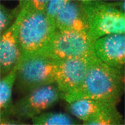 The fields of cellular engineering and biomolecular engineering involve the integration of chemical, physical, and biological sciences with engineering approaches to study and manipulate biological systems at the cellular and molecular levels, respectively. Fundamental research thrusts within cellular engineering include cellular mechanics, cell-cell and cell-matrix interactions, cell signaling, receptor-mediated phenomena, and systems biology of cellular decision processes. Research areas within biomolecular engineering include rational design of biomolecules, high-throughput screening of biomolecules, synthetic biology, evolution and selection of biomolecules from large libraries, and analysis of biomolecular functions and rate processes in physiological settings. Research tools for addressing problems in cellular and biomolecular engineering include a wide variety of experimental approaches as well as the development of theoretical and computational models. Specific examples of research application areas for these fields within our department include: stem cell differentiation, drug delivery, drug discovery, gene therapy, cell adhesion and motility, viral infection, cell signaling in cancer and efficacy of targeted cancer therapeutics, blood coagulation and thrombolysis, and DNA repair.
The fields of cellular engineering and biomolecular engineering involve the integration of chemical, physical, and biological sciences with engineering approaches to study and manipulate biological systems at the cellular and molecular levels, respectively. Fundamental research thrusts within cellular engineering include cellular mechanics, cell-cell and cell-matrix interactions, cell signaling, receptor-mediated phenomena, and systems biology of cellular decision processes. Research areas within biomolecular engineering include rational design of biomolecules, high-throughput screening of biomolecules, synthetic biology, evolution and selection of biomolecules from large libraries, and analysis of biomolecular functions and rate processes in physiological settings. Research tools for addressing problems in cellular and biomolecular engineering include a wide variety of experimental approaches as well as the development of theoretical and computational models. Specific examples of research application areas for these fields within our department include: stem cell differentiation, drug delivery, drug discovery, gene therapy, cell adhesion and motility, viral infection, cell signaling in cancer and efficacy of targeted cancer therapeutics, blood coagulation and thrombolysis, and DNA repair.
Affiliated Researchers: Paulo Arratia, Russell Composto, John Crocker, Scott Diamond, Dennis Discher, Cesar de la Fuente, Xue Sherry Gao, Daniel Hammer, Bomyi Lim, Lu Lu, Ravi Radhakrishnan
Catalysis and Reaction Engineering
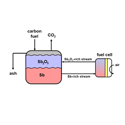 Catalysis is the study of materials used to enhance reaction rates and product selectivities. Reaction Engineering describes the processes that use these catalysts to make the final products. Ongoing research in these areas includes: Spectroscopic studies of model, single-crystal methanol-reforming catalysts under ultra-high vacuum conditions; Preparation of core-shell nanoparticles, prepared by self-assembly methods, for enhanced resistance against metal sintering; Characterization of the redox properties of mixed oxides for selective partial oxidation reactions. High-temperature electrochemical production of chemicals is also under investigation.
Catalysis is the study of materials used to enhance reaction rates and product selectivities. Reaction Engineering describes the processes that use these catalysts to make the final products. Ongoing research in these areas includes: Spectroscopic studies of model, single-crystal methanol-reforming catalysts under ultra-high vacuum conditions; Preparation of core-shell nanoparticles, prepared by self-assembly methods, for enhanced resistance against metal sintering; Characterization of the redox properties of mixed oxides for selective partial oxidation reactions. High-temperature electrochemical production of chemicals is also under investigation.
Affiliated Researchers: Scott Diamond, Dennis Discher, Raymond Gorte, Dohyung Kim, Peter Psarras, John Vohs, Jennifer Wilcox
Systems Engineering
 Systems engineering involves the analysis and optimization of processes for the design, operation, and control of chemical and biomolecular systems; e.g., chemical plants, energy conversion processes, consumer products, colloidal structures, and microfluidic screening devices. Research directions within systems engineering include nonlinear analysis (bifurcation and singularity theory), finite-element analysis, global optimization, optimal control, plant-wide control, uncertainty analysis, qualitative analysis and fuzzy logic, dynamic risk analysis (for safety and product quality), and molecular modeling and coarse-graining analysis.
Systems engineering involves the analysis and optimization of processes for the design, operation, and control of chemical and biomolecular systems; e.g., chemical plants, energy conversion processes, consumer products, colloidal structures, and microfluidic screening devices. Research directions within systems engineering include nonlinear analysis (bifurcation and singularity theory), finite-element analysis, global optimization, optimal control, plant-wide control, uncertainty analysis, qualitative analysis and fuzzy logic, dynamic risk analysis (for safety and product quality), and molecular modeling and coarse-graining analysis.
Affiliated Researchers: Scott Diamond, Dennis Discher, Daniel Hammer, Bomyi Lim, James Pikul, Peter Psarras, Warren Seider, Talid Sinno, Jennifer Wilcox,
Energy and Environmental Engineering
 Chemical engineering plays a pivotal role in increasing energy efficiency, developing more renewable energy resources, and decreasing the deleterious effects of chemical processing and energy conversion. Ongoing research project in these areas in the department include the development of highly efficient fuel cells and electrolysis cells for energy conversion, catalytic routes for the production of both hydrogen and fuels from biomass and bio-ethanol, and optimization of the growth of silicon crystals for use in solar cell production.
Chemical engineering plays a pivotal role in increasing energy efficiency, developing more renewable energy resources, and decreasing the deleterious effects of chemical processing and energy conversion. Ongoing research project in these areas in the department include the development of highly efficient fuel cells and electrolysis cells for energy conversion, catalytic routes for the production of both hydrogen and fuels from biomass and bio-ethanol, and optimization of the growth of silicon crystals for use in solar cell production.
Affiliated Researchers: Dennis Discher, Raymond Gorte, Dohyung Kim, Daeyeon Lee, James Pikul, Peter Psarras, Chinedum Osuji, Warren Seider, John Vohs, Jennifer Wilcox, Karen Winey
Molecular Simulation and Thermodynamics
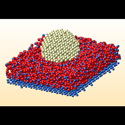 Molecular simulation and thermodynamics involves using molecular models to predict the properties of materials. This could include using fully atomistic simulations of DNA and proteins to predict biological function or using simplified “coarse-grained” models to predict the microstructure of either polymeric systems or deformed solids. Faculty are also involved in developing multi-scale modeling techniques that can simultaneously use combinations of atomistic simulations, coarse-grained models, field-theoretic simulations, or continuum mechanics.
Molecular simulation and thermodynamics involves using molecular models to predict the properties of materials. This could include using fully atomistic simulations of DNA and proteins to predict biological function or using simplified “coarse-grained” models to predict the microstructure of either polymeric systems or deformed solids. Faculty are also involved in developing multi-scale modeling techniques that can simultaneously use combinations of atomistic simulations, coarse-grained models, field-theoretic simulations, or continuum mechanics.
Affiliated Researchers: Russell Composto, Dennis Discher, Lu Lu, Amish Patel, Ravi Radhakrishnan, Robert Riggleman, Warren Seider, Talid Sinno
